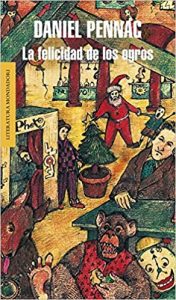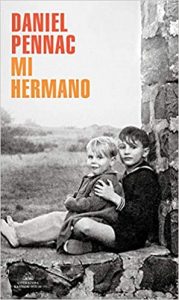For Daniel Pennac the same thing is to face a youthful plot as to plunge into a sociological essay. Between both creative spaces, a whole sort of plot lines (including a black gender very own harvest), through which this French author travels with the solvency of the writer convinced that there is no difficult path but will. Commitment and desire to tell something from the prism that touches at all times.
The problem with this multitasking function of the writer is the confusion that it can cause in the reader on duty more accustomed to the uniformity of each author, to the scenarios already known. But in that confusion is the magic. And in the gift of knowing how to narrate the very versatility of the world, the toast is produced with his literary vein unleashed.
So to enjoy Pennac you have to know which of his works are playing at all times. And here we will try to choose the best options for each moment ...
Top 3 recommended books by Daniel Pennac
Like a novel
No, it is not a novel, no matter how much it may seem. But it does speak about the notion of novels as a space for leisure, liberation, learning, mimicry and empathy. Something so beautiful that you may lose your idea of offering it as a subject for study ...
It is almost impossible not to feel challenged by this essay by Daniel Pennac, which has become a classic. Far from all grandiloquence and the feeling of superiority that tends to make teachers, parents and readers unfriendly and half ridiculous figures, the author puts on the scene the love of reading but above all the lack of love, because the true protagonists of this book are adolescents, anguished at the intimidating monstrosities of the required reading.
With the clarity of someone who has thought at length about the matter and with precise knowledge – perceptible in each sentence – of the real difficulties involved in teaching literature, Pennac formulates proposals of rare wisdom. There are no sermons or literary morals here, but rather a fierce and kind self-criticism, unusual among the supposed promoters of reading.
Although it was originally published in 1992, when the enemies of literature seemed to be film and television, this beautiful book not only maintains its validity but also seems particularly suitable for facing the present.
The happiness of the ogres
In noir, nothing is ever completely written and its ramifications extend towards thriller, mystery, strictly police, gore or many other new paths opened in a genre of great success among the reading public. But perhaps Pennac drew with his series of bizarre, French-style picaresque and disconcerting Benjamin Malaussene a strange mixture of deep interior manners with that black gender point that is the fact of surviving depending on where you have the success or the misfortune of being born ...
First of the novels starring the ineffable Malaussène, which critics described as a "miracle of freshness."
Who is Benjamin Malaussène? Is he a saint? An idiot? A happy man? The first-born of a curious and bizarre family, and responsible for a battalion of brothers, Malaussène lives in the Belleville neighborhood and works as a "scapegoat" in a Parisian department store.
If a buyer complains about a defective merchandise or a technical failure, Malaussène endures the anger and the threats of dismissal until the compassionate customer withdraws his claim. And thus, the management of the company saves money. But some mysterious explosions in the department stores complicate, even more if possible, the already precarious emotional health of our hero.
My brother
Literature can be healing. Of course it is not the only placebo with which to guide remedies against the miseries of the world. But it is that certain remedies are for author and readers. Because we must all assume that touch is not forever, that sooner or later you leave the scene or they leave you walking alone ...
Pennac's most intimate work, a memoir that turns Bartleby from Melville in a mirror to understand and remember his brother. In his most personal book to date, Daniel Pennac remembers his deceased brother in the most emotional and original way: through the figure of Bartleby, the famous Herman Melville scribe. Thus, Pennac expands the seams of mourning literature and uses his love of letters to create precious memories.
The author starts from a certainty shared by all: we never get to know our loved ones in their entirety. In order to better understand his brother, Pennac revisits Melville's procrastinating scribe, a character much loved by both of them, and turns him into a kind of mirror in which to observe and remember Bernard. Thus Pennac signs a book of infinite tenderness that becomes at the same time an ode to literature.



